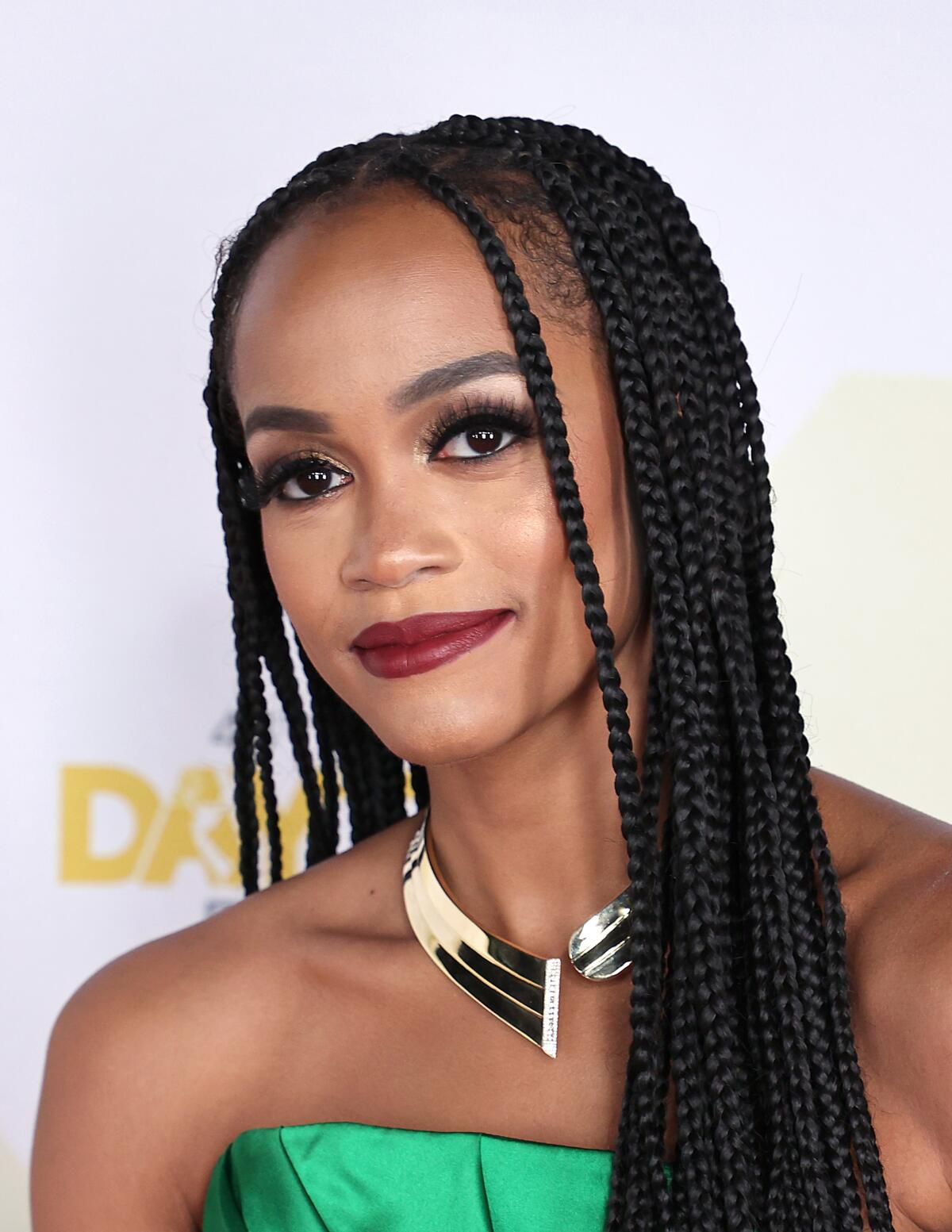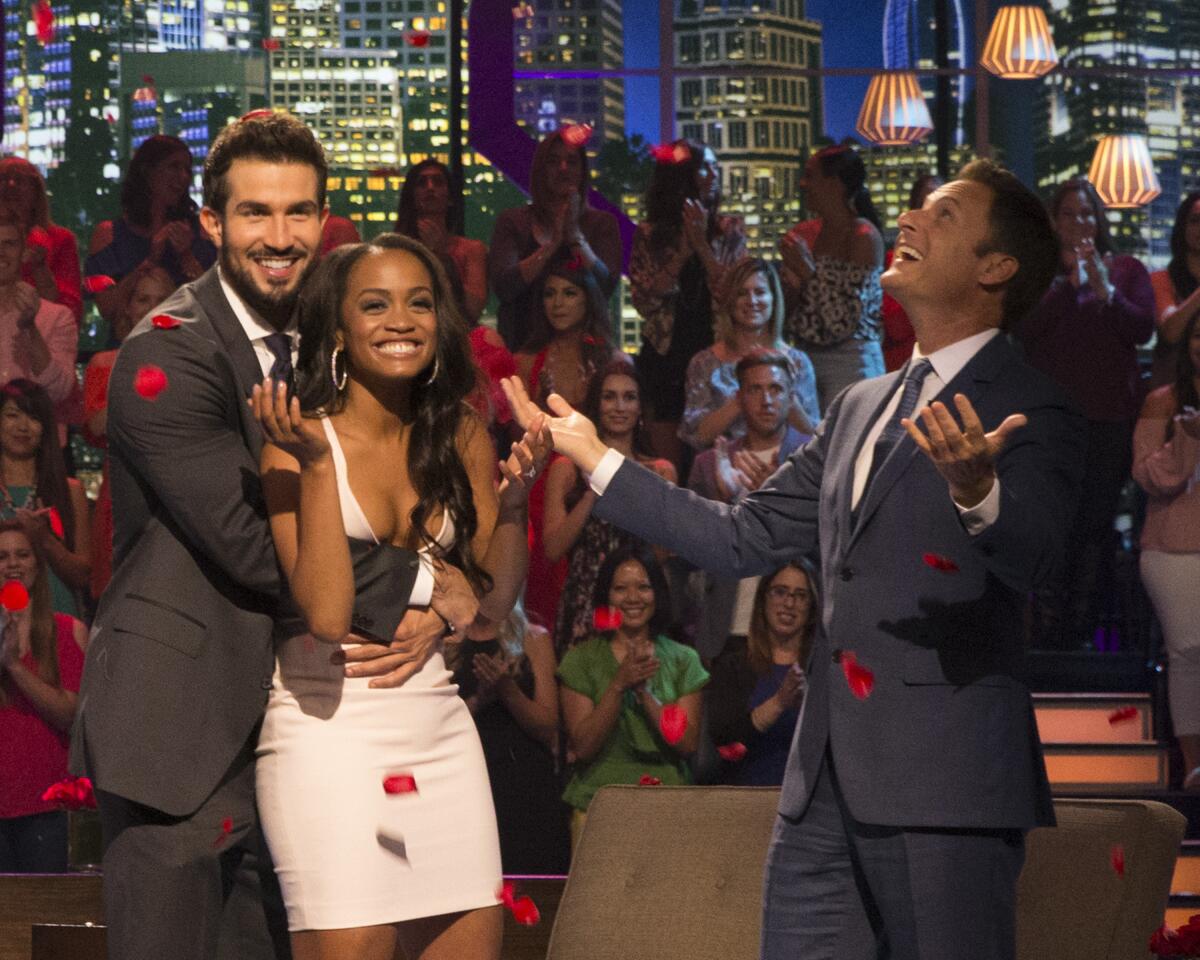Rachel Lindsay calls out ‘Bachelor Klan,’ says franchise tried to make her a ‘token’

- Share via
The “Bachelor” franchise’s first Black lead is fed up with toxic fans and the stereotype-driven reality property, and she’s not mincing words.
“Bachelor Klan is hateful, racist, misogynistic, xenophobic, and homophobic,” former “Bachelorette” Rachel Lindsay writes in a first-person essay for New York Magazine published Monday, distinguishing the subgroup from the diehards known as “Bachelor Nation.” “They are afraid of change. They are afraid to be uncomfortable. They are afraid when they get called out.”
Lindsay doesn’t stop there: In addition to shining a light in the piece on the producer manipulations that occur on ABC and Warner Bros.’ popular “reality” series, she called out New York’s cover headline — “Oops, I Blew Up ‘The Bachelor’” — as “disappointing and disrespectful ... clickbait” in an Instagram post.
The 36-year-old lawyer begins her story by saying she knew her relationship with “The Bachelor” was over “when Chris Harrison, the host and face of the franchise, showed his true self on national television” during an interview with Lindsay on “Extra” in February.
She recalls the moment when she asked then-host Harrison, who has since left the franchise, about his thoughts on “Bachelor” contestant Rachael Kirkconnell and the allegations of racism attached to her, comparing the tense exchange to “catching him with a hot mic.”
After pledging ‘real change’ amid last year’s protests, ABC and owner Walt Disney Co. stayed silent as a firestorm over race consumed its reality-TV flagship.
Shortly thereafter, some “Bachelor” fans harassed Lindsay on social media, and Lindsay later shared on her Ringer podcast “Higher Learning” that she needed to step away from the franchise. After being vilified by viewers who dubbed her a troublemaker and “Bachelor Nation’s public enemy No. 1,” she wrote, “I’m exhausted from defending myself against a toxic fandom.”
In the New York piece, Lindsay recounts her journey from a law firm in Dallas, fresh off the end of a five-year relationship, to the “Bachelor” franchise, first as a contestant on “The Bachelor” and then as “Bachelorette.” “I was a token until I made sure I wasn’t,” she writes of her experience on the series, on which she says casting failures and a lack of diversity behind the scenes left her exposed.
She knew the audience would perceive her interactions with white female contestants, notably Vanessa Grimaldi, as those of an “an angry Black female” and was frustrated by being sent on a one-on-one excursion with one suitor to “explore the narrative of a Black man who had barely dated any Black women.”

Following her season of “The Bachelorette,” on which she met and married Bryan Abasolo, whom she calls the “love of my life,” Lindsay recalls that her participation in the franchise started to become “untenable” when video of former “Bachelorette” Hannah Brown using a racist slur surfaced. While the selection of the first Black “Bachelor,” Matt James, made Lindsay hold off on her plan to “disassociate” from the franchise because she believed change was on the horizon, her hopes were quickly dashed when the cycle repeated itself during James’ season.
Feeling thwarted in her ardent push for the franchise to change, Lindsay writes that she will no longer make herself “available to ‘The Bachelor’ universe” as “a figurehead,” “a spot-filler” or the “face of what is diverse.” Instead, she’ll be watching Michelle Young’s upcoming season of “The Bachelorette” and supporting her from afar. “I wouldn’t come back and talk about something if they paid me.”
More to Read
The complete guide to home viewing
Get Screen Gab for everything about the TV shows and streaming movies everyone’s talking about.
You may occasionally receive promotional content from the Los Angeles Times.







